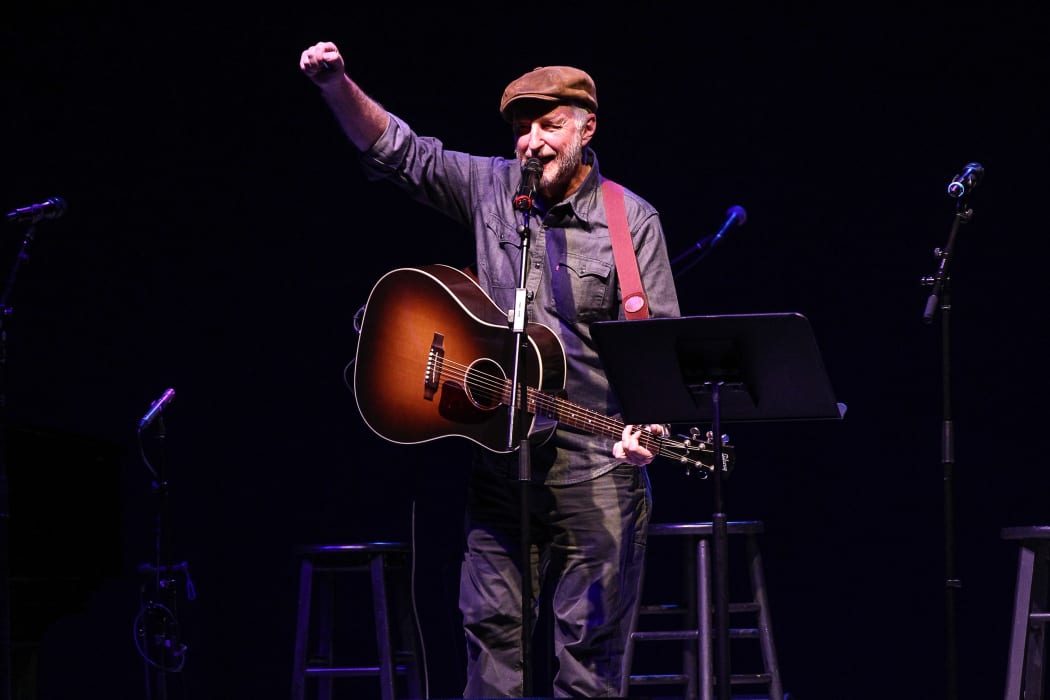British singer songwriter Billy Bragg has 35 years of political activism under his belt. A life-long Labour Party supporter, he told Jesse Mulligan the left needs to do a lot of hard thinking to come back from a thumping in the December 13 general election.
Bragg is visiting New Zealand next year as part of his upcoming tour.

Billy Bragg performs in Nashville 2017. Photo: AFP / FILE
Labour leader Jeremy Corbyn was on a hiding to nothing, Bragg says.
“Corbyn was not popular on the doorstep, he brought a lot of baggage with him as an individual, he’d been in politics a long time.
“Also, the press that supports the Conservative Party were very loud. But really, overall, I think it was probably Brexit.
“Because the Conservative voters had the leave voters sewn up, the Liberal Democrats went directly for remainers but unfortunately, of all the parties, only Labour had an electorate that was split between leave and remain.”
The Conservative’s simple sloganeering cut through, he says.
“There was nothing in the election that could compete with the Tories’ entire manifesto which was just three words: Get Brexit Done.
“People are so sick of it, they just want to get it done and sadly the truth is all that’s going to get done is the first chapter, when we leave, if we do leave in the New Year, possibly at the end of January then the negotiations begin, this could get dragged out for 5 years.”
He says a liberal democracy itself took a beating in the election.
“In some ways although clearly the Labour Party were the big losers, you could argue that liberal democracy itself lost on Thursday.
“The idea that policies have to be based on promises that you keep, the idea that facts are sacred, the idea that the other person in the other political party is not your enemy but someone who wants to make the country better but has a different approach to it. All of those kind of ideas have been pushed out the way by Boris Johnson and the Conservative Party.”
Bragg says this is the new political reality.
“I think not just the Labour Party but the Liberal Democrat Party need to come to terms with a new landscape in which the majority of voters in England and in Scotland voted for different forms of nationalism; Scotland is a more progressive nationalism, but in England I’m afraid it’s a rather isolationist nationalism.”
Bragg still has faith in the power of song, but is under no illusions about music’s power to change.
“Music can’t change the world trust me, I’ve tried really hard, over the last 33 years I’ve done my best to see if music will change the world. But it doesn’t have agency, only the audience have agency.
“So, my job is to make them feel like they can change the world, because the best antidote to cynicism is activism.”
Bragg jokingly bridles at the suggestion he has yet to bond with Dunedin - which is on the tour itinerary next year.
“Dunedin? I’ve been there four times. How many times has Paul Weller been there? When was the last time Coldplay went to Dunedin eh? Apparently, it’s the furthest city in the world from where I’m sitting right now. When I go down there I’ll have five Dunedin stripes on my arm.
“Kiwis always say you never come to New Zealand and I say look I’ve been to Dunedin four times - don’t give me grief. I love going down there, I really do, you feel you’ve toured the world when you’ve been all the way down there and it starts getting cold again, like the north of Scotland, yeah this has been a world tour, I’m good here.”
Bragg is seeing all ages at his shows now and this gives him cause for hope.
“I was recently in Cambridge on the first Friday in December, which was the school strike Friday, they were out for climate change, some of those kids were 8 - 9 years old. And they were singing some of the old songs and we marched through the main shopping centre in the middle of Cambridge with these kids chanting ‘Adults! Adults! Use your vote!’ It was so empowering.”
That sense of solidarity was a formative experience for Bragg as a young man in the late 1970s when he saw The Clash play.
“I went to see them at Rock Against Racism…I felt strongly about racism, but I never said anything about it, where I worked there was a bunch of guys there they were casually racist, sexist and homophobic.
“When I went on that march I went to the park where the gig was, Victoria Park in Hackney, there were 100,000 kids just like me. And I understood that day that this was the issue that my generation would define themselves by – opposition to discrimination of all kinds. Like the Vietnam War was for the previous generation.
“So, when I came home the world hadn’t changed, my mum still made me liver and bacon for tea because it was Sunday, but when I went to work on Monday morning I had changed. And I wasn’t going to put up with those guys anymore being casually racist.
“That’s how much music mattered, it was the solidarity of the audience, not what the Clash said or anybody else, it was being in that audience and knowing this was bigger than just me and I should be part of it, knowing I was different from those blokes at work.”

